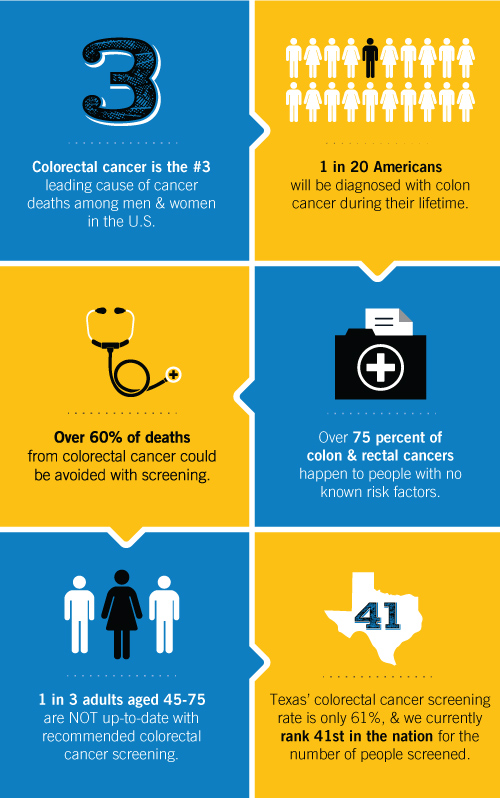Stop your colorectal cancer before it happens.
Colorectal cancer is highly preventable, and timely colonoscopies are the only way to achieve that goal. Don’t wait for symptoms!
If you’re age 45+ (or younger, if you’re at higher risk of colorectal cancer), then it’s time to have a colonoscopy.
Request Appointment
Here are some risk factors that may warrant having your first colonoscopy before age 45:
- A family or personal history of colon polyps or cancer
- You are experiencing symptoms of colon cancer (list below)
- Inflammatory bowel diseases, such as ulcerative colitis or Crohn’s disease
- Certain genetic conditions such as hereditary nonpolyposis colon cancer (HNPCC) or familial adenomatous polyposis (FAP)
- Belonging to certain ethnic groups, including African-Americans, Native Americans, Alaskan Natives and Jews of Eastern European descent (Ashkenazi Jews)
After your first colonoscopy, you should have one done:
- Every 10 years if you didn’t have polyps and have an average risk
- Every 2-5 years if you had multiple polyps, precancerous polyps, large polyps, or a higher risk of developing colon cancer
Colorectal Cancer Screening Guidelines
In 2018, The American Cancer Society lowered their screening recommendation to age 45. Recently, the US Preventive Services Task Force and US Multi-Society Task Force changed their recommendation to age 45 as well. However, only a few insurance companies have adjusted their reimbursement policies to reflect the new recommendations.
Please check with your insurance company to see if they have adopted the new guidelines to cover screening colonoscopies.
People with a life expectancy of more than 10 years and in good health should continue regular colorectal cancer screening through the age of 75.
People ages 76 through 85, should consider screening based on personal preferences, life expectancy, overall health, and prior screening history.
People over 85 should no longer get colorectal cancer screening.
Request Appointment
Don’t wait for colorectal cancer symptoms to have a colonoscopy!
Precancerous polyps don’t typically produce noticeable symptoms. Colon cancer that is found early has a 90% survival rate for 5 years. That number goes down to only 15% if it is found at a later stage and has already spread to other parts of the body.
If you have any of the following signs of colorectal cancer, seek our assistance immediately:
- A change in bowel habits, including diarrhea, constipation or a change in stool
- Rectal bleeding, or blood in your stool
- Persistent abdominal discomfort, such as cramps, gas, pain, feeling full or bloated
- Nausea or vomiting
- Unexplained weight loss
- Chronic fatigue

How do colonoscopies prevent colorectal cancer?
All colorectal cancers start as precancerous polyps, which are growths that protrude from the inner wall of the large intestine. Colonoscopy is the gold standard for finding and painlessly removing these polyps before they turn into cancer.
In fact, US colon and rectal cancer rates have dropped 30% in the last 10 years among adults age 50+. Why? More Americans are having screening colonoscopies to prevent cancer. But despite that, colorectal cancer is still the third-leading cancer killer in the United States. Let’s work together to change that.
Request Appointment
What happens during the colonoscopy procedure itself?

Using a colonoscope, we inspect your entire rectum and colon.
A colonoscope is a thin, flexible tube with several devices on the end, including a light, camera and a tool for removing polyps. Your doctor will insert the colonoscope and guide it to the end of the colon, and then slowly remove it while looking for polyps. Fecal matter can hide polyps from view, so excellent preparation is important. If your doctor finds a polyp, he will painlessly remove it and send it to a pathology lab for examination.
Leading the way with exceptional colonoscopy performance.
By choosing GCSA for your colonoscopy, you’re securing a thorough, professional procedure and improving your odds of avoiding colorectal cancer. We exceed the national standard in three key areas of colonoscopy performance. By ensuring we reach the end of the colon and taking our time during the examination, we discover precancerous polyps far more frequently than the average practice. Here are the numbers to prove it:
How often the furthest point of the colon is reached during a colonoscopy.
| GCSA |
National Standard |
| 99.9% |
95% |
Average time spent examining the colon.
| GCSA |
National Average |
| 7 minutes |
6 minutes |
How often precancerous polyps are found during a screening colonoscopy.
| GCSA |
National Standard |
| Male: 45% |
Male: 30% |
| Female: 34% |
Female: 20% |
Your easy-prep colonoscopy, broken down into four simple steps:
- Consultation – We’ll review the procedure with you, answer any questions you have and prescribe your easy-prep kit. Click to schedule a consultation
- Preparation – The night before your procedure, you will drink your first liquid-based solution, then repeat another consumption of the liquid-based solution the morning of your procedure to cleanse your colon. Newer options taste better and use a fraction of the total liquid. Some can even be mixed with a tasty sports drink.
- Procedure – During the procedure, you will be completely sedated to ensure maximal comfort. At GCSA, every colonoscopy is performed by a board-certified gastroenterologist who has extensive experience identifying polyps and colorectal cancer.
- Recovery – Because you’ll be sedated during your procedure, you’ll need someone to drive you home afterward. You can eat whenever you feel comfortable and return to your normal activities the next day.
Request Appointment
Screening colonoscopies are generally exempt from your insurance deductible.
Because screening colonoscopies are the gold standard for preventing colorectal cancer, most insurance plans (including Medicare) will exempt them from your deductible, minimizing or eliminating your out-of-pocket costs! To learn more about the difference between screening and diagnostic colonoscopies, click here.
There are also more companies that are covering screening colonoscopies starting at the recommended age of 45, rather than 50. For example, Blue Cross Blue Shield, Humana, and Cigna all cover colonoscopies starting at 45.
If your insurance does not cover colonoscopy screenings beginning at age 45, we recommend asking the insurance company to review the new guidelines from the American Cancer Society. The more patients who make this request, the faster insurance companies will update their reimbursement policies.
We accept most insurances, including HMO, PPO, Medicare and Medicaid plans.
Colonoscopies typically receive excellent insurance coverage, and we accept a wide variety of plans to make screening for colorectal cancer affordable for as many people as possible. However, your plan may still require some out-of-pocket contribution. We offer CareCredit® and in-house financing to make sure you can access this important procedure. To learn more about insurance and financial policies, visit our FAQ.
To schedule an appointment or learn more about how Gastroenterology Consultants of San Antonio specializes in easy-prep colonoscopies in the San Antonio communities of Medical Center, Stone Oak, Northeast, Westover Hills, Boerne or Bulverde, call 210.614.1234 today. You can also request an appointment online here.
Colonoscopy Testimonials
“My first time for a colonoscopy, everyone there was extremely nice, helpful, and made me feel completely at ease. Everything was explained thoroughly beforehand and I felt fine afterwards. I would recommend this office on Toepperein to anyone who needs a procedure done right.” – Lisa
“Went to GCSA this week for my dreaded first colonoscopy. I highly recommend Dr. James Jackson! He immediately put me at ease and spoke with me before and after the procedure. All the nurses and anesthesiologist were also great! Everything went well and I received the best news possible- come back in 10 years!!” -Jaycene
“A colonoscopy is not what you look forward to but it is necessary part of life after 50. Dr. Jorge Cavazos puts you at ease and make the experience tolerable. The word colonoscopy is scary but not with Dr. Cavazos as your Dr. Plus Gastroenterology Consultants uses an easier prep and a sample diet that makes it even easier.” -Paula
Colonoscopy Prep Testimonials
“The prep wasn’t nearly as bad as I was expecting. Everyone had me scared that it was a lot of volume, but it was one glass in the evening and one in the morning. Super easy!” -JoAnn
“The prep was much easier to take (this time).” -Matt
“The prep this time was much easier than 10 years ago.” -Keith
“This was my first screening colonoscopy and the negative comments about the prep were not true for me.” -John
“The new way they do the prep is easy and lets you get a good night’s sleep.” -Gary
Request Appointment















